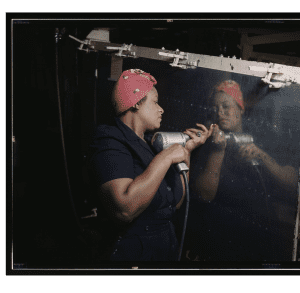In honor of Black History Month, we wanted to celebrate some of the amazing innovators in skilled trades industries.
Written by Ashleen Brydum
Today, we feature John Barfield, David Nelson Crosthwait Jr, Richard B. Spikes, and Eugenia Powell Deas, all innovators in their fields. Read on to learn how these Black individuals broke through barriers and overcame adversity to make major contributions to their industries:
John Barfield – Businessman in Building Maintenance & Repair
John Barfield was born on February 8, 1927 in Tuscaloosa, Alabama to Lena and Edgar Barfield. Barfield was always determined to create a better life for his family. Using his entrepreneurial spirit as early as age 8, he learned to become a soap salesman making a commission for each box sold.
After dropping out of school and joining the Army, Barfield got a job as a janitor at the University of Michigan. He worked there from 1949-1954. In Michigan, he observed his surroundings and found a way to make a buck off of the things others did not want to do. He would wash professors’ cars on the weekend, clean houses, wash windows, and disinfect toilets of the new builds popping up around town. Quickly, the Barfield Cleaning Company was born, but Barfield was just getting started.
Barfield’s year of knowledge of building maintenance and repair (BMR) lead to the creation of Barfield Building and Maintenance Company. As one of the leading innovators in BMR, Barfield established Barfield Manufacturing Company and incorporated with his other firm to become the multi-million dollar Bartech Group. He has since earned many awards and honorary degrees for his efforts in both business and in giving back to the community.
David Nelson Crosthwait Jr. – Pioneer in HVAC Design
David Nelson Crosthwait Jr had a knack for inventing from a young age.
Born in Nashville, TN in 1898 to the principle of the city’s first Black high school, Crosthwait Jr spent most of his early years tinkering with various items. This passion for innovation led him to earn a full scholarship for a master’s degree in engineering at Purdue University.
After graduation, Crosthwait Jr continued creating new products to heat and ventilate buildings for the C.A. Dunham Company (now Dunham-Bush). Thanks to his cleverness, Crosthwait Jr quickly became the director of the research department.
David Nelson Crosthwait Jr’s most notable accomplishment was designing the steam system used to heat Radio City Music Hall. The heating unit was an essential component in keeping the music hall’s patrons comfortable while the Rockettes dazzled in the Christmas Spectacular every year!
In his lifetime, Crosthwait Jr obtained more than 120 international and US patents and significantly contributed to the craft of heating, ventilation, and air conditioning (HVAC). We remember David Nelson Crosthwait Jr. not only for the barriers he pushed through. Crosthwait Jr is an inspiration to all innovators and engineers for the many advances he brought to the field of HVAC.
Richard B. Spikes – Inventor and Innovator in Automotive Repair
Richard B. Spikes was a man of several talents and ideas. Many of his prolific inventions and patents were in the automotive industry. However, Spikes is also credited with significant innovations to everything from the barber chair to the keg to trolley cars.
Spikes was born on October 2, 1878 in present day Oklahoma. Throughout a lifetime of inventing, Spikes patented the automotive gearshift in 1932 and later he would go on to patent the automatic break safety system in 1962. Due to a lifelong battle with glaucoma, Spikes was losing his eyesight. By the time the brake system was completed, Spikes was legally blind.
Spikes’ work is still used in some buses today, and his work was essential to the automotive industry. Spikes died on January 22, 1963 in his home of California.
Eugenia Powell Deas – A Welder Who Defied the Odds
Eugenia Powell Deas faced adversity soon after she was born, when at just seven months old her mother passed away. However, even through all the changes in her childhood, she remained happy and had a passion to work hard.
Deas pushed through racial and societal barriers to graduate high school. She secured a job as an electric welder at Charleston Navy Shipyard, focusing on honing her welding craft. She quickly became one of the best welders at the Shipyard, proving that quality work does not have a race or gender.
Eugenia Powell Deas was the only Black woman welder at the Charleston Navy Shipyard during World War II. In a 2018 Interview Deas recalled her time at the Shipyard, “…You know what they used to call me? One chocolate drop in the box, because I was the only Black women welder. The other women there would do the cleaning and the cooking, but I wanted to do something besides clean and cook, so I was a welder.”
In addition to a talented welder, Deas also was a devoted mother raising nine children and sending them all to the college of their choice. Eugenia Powell Deas defied incredible odds to work hard and do what she loved. She is one of the early innovators for women in the welding field, and we are proud to celebrate her and her accomplishments.
About Tidewater Tech
Tidewater Tech is a career training school that specializes in trade vocations including Auto Technician, Heating, Ventilation and Air Conditioning (HVAC), Building Maintenance and Repair and Welding. The school offers professional facilities, knowledgeable instructors, day or evening classes, job placement assistance, and is accredited by the Commission of the Council of Occupational Education (COE). Tidewater Tech is certified to Operate by SCHEV. Learn more at tidewatertechtrades.edu or like them on Facebook at https://www.facebook.com/TidewaterTech.edu/.

